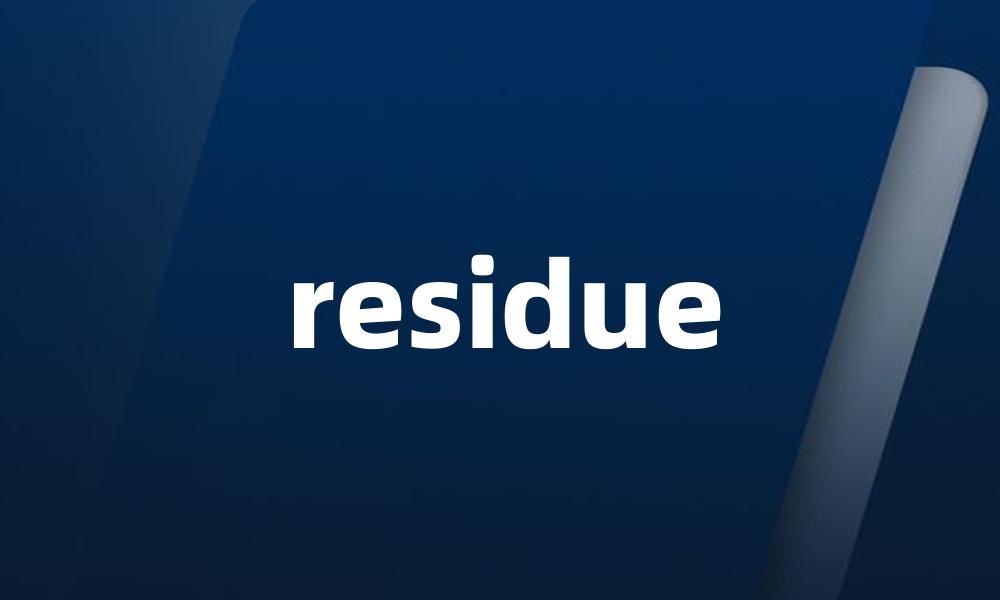
residue
形容词
1. 残留的;剩余的
英:remaining; leftover
例句:
- There was a residue of food left on the table after the party.(晚会结束后,桌子上剩下了一些食物。)
- They cleaned up the residue of the fire.(他们清理了火灾的残留物。)
名词
1. 残余物;剩余部分
英:remnant; remainder
例句:
- The residue of the meal was thrown away.(剩餐被扔掉了。)
- There was a small residue of water in the bottle.(瓶子里有一点残余的水。)
2. 残渣;沉淀物
英:sediment; deposit
例句:
- The residue at the bottom of the cup was difficult to clean.(杯子底部的残渣很难清理。)
- After the chemical reaction, a residue forms.(化学反应后会形成沉淀物。)
词语辨析
residue, remainder, remnant
这三个名词都指剩余的部分,但用法略有区别。
residue主要指剩余物或剩余部分的残留物,强调剩余物是一种残留,通常不是可用的或有价值的。
remainder一般指在一件事物或过程的后期剩下的部分,常用于抽象或数量上的剩余。
remnant则指一般意义上的剩余部分,常指残余物或遗留物。
词汇扩充
1. 残留物
英:leftover; remains; debris
例句:
- There were some leftovers from last night's dinner in the fridge.(冰箱里有昨晚晚餐的剩菜。)
- The remains of the old castle can still be seen.(古城堡的遗址仍然可见。)
- After the explosion, the debris was scattered everywhere.(爆炸后,残骸散落在各处。)
2. 沉淀物
英:sediment; precipitate; dregs
例句:
- The sediment at the bottom of the wine bottle should not be consumed.(酒瓶底部的沉淀物不应饮用。)
- After the chemical reaction, a precipitate formed.(化学反应后生成了沉淀物。)
- The dregs in the coffee cup were unpleasant to drink.(咖啡杯里的渣滓令人不愉快。)
近义词
remainder, remnant, leftover, remains, sediment, precipitate
反义词
consumption, utilization, usage
柯林斯词典
residue (noun)
- The residue of something is a small amount that remains after most of it has gone.(某物的残留物是大部分消失后剩下的一小部分。)
- A residue is the part of something that remains after the rest of it has been removed, or that remains in the same place after the rest of it has been taken away.(残余物是在其余部分被移除后剩下的一部分,或者是在其余部分被取走后仍然留在原处的一部分。)
residue (adjective)
If there is a residue of something, there is a small amount of it left behind after a process has been completed.(如果有某物的残留物,那么在一个过程完成后,会剩下一小部分。)
牛津词典
residue (noun)
- A small amount of something that remains after the main part has gone or been taken or used.(主要部分消失、被取走或使用后剩下的一小部分东西。)
residue (adjective)
Remaining after the greater part or quantity has gone.(在较大部分或数量消失后剩下的。)
用法
1. "residue" 作为名词时,常与介词 "of" 连用,表示某物的残留物或剩余部分。
2. "residue" 作为形容词时,修饰名词时常位于名词前面。
例句
- There was a residue of food left on the table after the party.(晚会结束后,桌子上剩下了一些食物。)
- They cleaned up the residue of the fire.(他们清理了火灾的残留物。)
- The residue of the meal was thrown away.(剩餐被扔掉了。)
- There was a small residue of water in the bottle.(瓶子里有一点残余的水。)
- The residue at the bottom of the cup was difficult to clean.(杯子底部的残渣很难清理。)
- After the chemical reaction, a residue forms.(化学反应后会形成沉淀物。)
- There were some leftovers from last night's dinner in the fridge.(冰箱里有昨晚晚餐的剩菜。)
- The remains of the old castle can still be seen.(古城堡的遗址仍然可见。)
- After the explosion, the debris was scattered everywhere.(爆炸后,残骸散落在各处。)
- The sediment at the bottom of the wine bottle should not be consumed.(酒瓶底部的沉淀物不应饮用。)
- After the chemical reaction, a precipitate formed.(化学反应后生成了沉淀物。)
- The dregs in the coffee cup were unpleasant to drink.(咖啡杯里的渣滓令人不愉快。)

 小皮
小皮